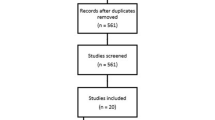Abstract
Background
This study examined differences in gastric bypass surgical outcomes by comparing two groups of female patients: those with a history of sexual abuse (SA) and those without a history of sexual abuse (NSA).
Methods
Participants who agreed to participate in the study were assessed at either 6–18 months or 19–40 months postsurgery. Outcome measures included body mass index (BMI), level of depression as measured through the Beck Depression Inventory, level of self-esteem as measured through the Rosenberg Self-esteem Scale, and BISS as measured through the Body Image State Scale. Two-by-two analyses of variance (ANOVAs) were conducted for each of the four outcome variables.
Results
ANOVA results revealed that BMI was the only variable to be found statistically significant among the four dependent measures. At 6–18 months postsurgery, the SA group had significantly higher BMI than the NSA group. Compared BMI during the two postsurgery time periods, the SA group had a significantly lower BMI at 19–40 months than the SA group at 6–18 months postsurgery.
Conclusion
The results suggest that females with a history of sexual abuse did not differ from their counterparts with regard to depression, self-esteem, and body dissatisfaction at baseline, as well as years after surgery. Given the improvement in BMI from the sexual abuse group at 6–18 months postsurgery to 19–40 month postsurgery, patients may not be as concerned with maintaining excess weight as a defense against potential future abuse as originally proposed.
Similar content being viewed by others
References
Hsu GLK, Benotti PN, Dwyer J, et al. Nonsurgical factors that influence the outcome of bariatric surgery: a review. Psychosom Med. 1998;60:338–46.
Felitti VJ. Long-term medical consequences of incest, rape, and molestation. South Med J. 1991;84:328–31.
Felitti VJ. Childhood sexual abuse, depression, and family dysfunction in adult obese patients: a case control study. South Med J. 1993;86:732–6.
Ray EC, Nickels MW, Sayeed S, et al. Predicting success after gastric bypass: the role of psychosocial and behavioral factors. Surgery. 2003;134:555–64.
Grilo CM, White MA, Masheb RM, et al. Relation of childhood sexual abuse and other forms of maltreatment to 12-month postoperative outcomes in extremely obese gastric bypass patients. Obes Surg. 2006;16:454–60.
Buser A, Dymek-Valentine M, Hilburger J, et al. Outcome following gastric bypass surgery: impact of past sexual abuse. Obes Surg. 2004;14:170–4.
Oppong BA, Nickels MW, Sax HC. The impact of a history of sexual abuse on weight loss in gastric bypass patients. Psychosomatics. 2006;47:108–11.
Clark MM. Sexual abuse survivors and psychiatric hospitalization after bariatric surgery. Obes Surg. 2007;17:465–9.
Rosenberg M. Society and the adolescent self-image. Princeton: Princeton University Press; 1965.
Shahani C, Dipboye RL, Phillips AP. Global self-esteem as a correlate of work-related attitudes: a question of dimensionality. J Pers Assess. 1990;54:276–88.
Crandall R. The measurement of self-esteem and related constructs. In: Robinson J, Shaver P, editors. Measures of social psychological attitudes. Ann Arbor: ISR; 1973. pp. 80–2.
Beck AT, Steer RAQ, Brown GK. Beck depression inventory manual. 2nd ed. San Antonio: Psychological Corporation; 1996.
Dozois DJ, Dobson KS, Ahnberg JL. A psychometric evaluation of the Beck Depression Inventory-II. Psychol Assess. 1998;10:83–9.
Cash TF, Fleming EC, Alindogan J, et al. Beyond body image as a trait: the development and validation of the body image state scale. Eat Disord. 2002;10:103–13.
Kendall-Tackett K. The health effects of childhood abuse: four pathways by which abuse can influence health. Child Abuse Negl. 2002;26:715–29.
Herpertz S, Kielmann R, Wolf AM, et al. Does obesity surgery improve psychosocial functioning? A systematic review. Int J Obes Relat Metab Disord. 2003;27:1300–14.
Wadden TA, Sarwer DB, Womble LG, et al. Psychosocial aspects of obesity and obesity surgery. Surg Clin North Am. 2001;81:1001–24.
Wiederman MW, Sansone RA, Sansone LA. Obesity among sexually abused women: an adaptive function for some? Women Health. 1999;29:89–100.
Larsen JK. Childhood sexual abuse is not associated with poor outcome after gastric banding for severe obesity. Obes Surg. 2005;15:534–7.
Author information
Authors and Affiliations
Corresponding author
Rights and permissions
About this article
Cite this article
Buser, A.T., Lam, C.S. & Poplawski, S.C. A Long-Term Cross-Sectional Study on Gastric Bypass Surgery: Impact of Self-Reported Past Sexual Abuse. OBES SURG 19, 422–426 (2009). https://doi.org/10.1007/s11695-008-9555-2
Received:
Accepted:
Published:
Issue Date:
DOI: https://doi.org/10.1007/s11695-008-9555-2




